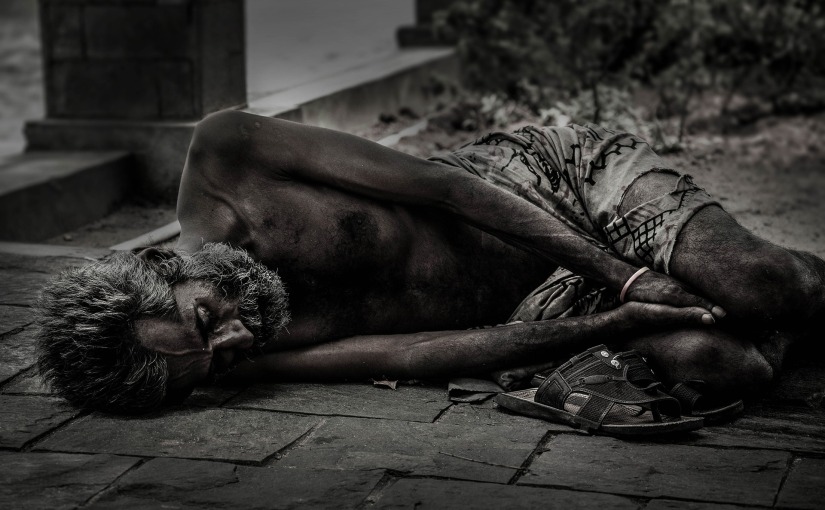Luke 16: 19-31, The Rich Man and Lazarus
Staring down over five decades immersed in scripture and music, it is hard sometimes to avoid musical renderings of a text. Reading the famous Gospel story of the Rich Man and Lazarus, I hear the boys barbershop quartet from Henderson High School in Chamblee, Georgia, circa 1975…
“Dip your finger in the water… come and cool my tongue ‘cause I’m tormented in the flames.” The famous passage from the 16th chapter of Luke is one of the most well-known of Jesus’ parables. We have an unnamed Rich Man who wears beautiful clothes and gorges himself at feasts. Outside his gate lies a poor man named Lazarus. (In Greek the words seem to suggest Lazarus is “dumped” at the Rich Man’s gate.) Covered with sores, Lazarus can’t even fend off the dogs. The story implies that the Rich Man ignored ample opportunity to intervene.
When both men die, the Rich Man, now burning in Hell, sees Lazarus at the bosom of Abraham. He begs Abraham to send Lazarus to bring water and comfort. Abraham replies that such is not possible, for there is a great chasm between them. The Rich Man then asks Abraham to send Lazarus to warn his brothers still alive. Abraham replies that the brothers will not believe a man risen from the dead as they have already ignored the warnings of Moses and the Prophets.
Pretty obvious where this goes, don’t you think?
- Poor=Good
- Rich=Bad
- Treat the poor well and receive your reward in heaven
- Treat the poor badly and be tormented in the flame
- Maybe we should all raise our tithing percentage to the Church, for fire insurance if for no other reason
- Maybe those of us who trust in God while living large should rethink the excess of our lifestyle
It is amazing, when you think about it, how much Jesus talks about money. Journeying through Luke’s chapters 15 and 16 we hear the famous parables of the widow’s coin, the prodigal’s inheritance, and the dishonest manager. We have been told that it is not money in and of itself, but the love of money that is the “…root of all evil.”
I would ask us to consider carrying the idea one step further. I do believe any form of blessing… money, talent, fame… can also be a curse. Having such things provides enormous resources for doing good. It is hard to support the building of hospitals, universities and cathedrals if you have no funds to contribute. No, being rich in and of itself is not bad. What matters is what you do with riches.
Ideas two and four of my cozy list smack of a works theology that, though popular and self-serving for the Church to proclaim, flies in the face of a gospel of grace. Can any of us do enough to be deserving of salvation and a home in Abraham’s bosom? No. Our service to the poor is not a quid-pro-quo, but a response to the unmerited grace offered to us in Jesus Christ.
Should we in (as) the Church be always assessing our lifestyle in the context of our daily living? Absolutely! One of my favorite hymn verses is from the early 20th century American clergyman Harry Emerson Fosdick:
Shame our wanton, selfish gladness,
Rich in things and poor in soul.
I would suggest another level here that, much of the time, even in the Church, or especially in the Church, we just don’t get. I think the larger question is “What is it that defines us?”
Even with the fires of Hell searing his face, the Rich Man didn’t get it. Did you notice how he commanded Abraham to send Lazarus to bring him water. Then, when that didn’t work, he commanded Abraham to send Lazarus to warn his brothers. Even though Lazarus was comforted in eternal joy and the Rich Man condemned to eternal torture, the Rich Man still saw Lazarus as his servant.
One of the richest and most godly men I have known in this life lived as simply and humbly as the poorest person you would ever meet. Quietly, he sought to use the resources he believed that God had entrusted to him to help people and to make the world a better place. Sometimes that meant giving money. Sometimes that meant choosing not to give money, but to use money and its lessons for teaching values.
I have known hundreds of others who have used their wealth, whether modest or great, to define themselves in the context of others. Sometimes, like the Rich Man, this has taken the form of opulent living. Sometimes it has taken the form of undue and improper influence. Often it has taken the form of building and bowing to one false idol after another.
I think we can find something of this in every one of Jesus’ parables that focuses on money. One of the most vivid is the story of the rich young ruler who comes to follow Jesus. Jesus replies, “Cool. Go sell all of your stuff, give the cash to the poor, and let’s get started!” But the parable tells us that the young ruler went away sad because “he had great wealth.” It was not the wealth itself, but how the wealth defined him that resulted in the sadness of the rich young ruler.
Jesus calls us to be defined in Him, heart and soul, mind and spirit, with all that we have, all that we have been, and all that we ever hope to be.
